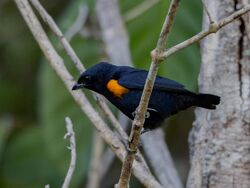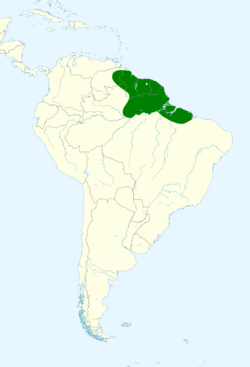Biology:Golden-sided euphonia
| Golden-sided euphonia | |
|---|---|

| |
| male | |

| |
| female | |
| Scientific classification | |
| Domain: | Eukaryota |
| Kingdom: | Animalia |
| Phylum: | Chordata |
| Class: | Aves |
| Order: | Passeriformes |
| Family: | Fringillidae |
| Subfamily: | Euphoniinae |
| Genus: | Euphonia |
| Species: | E. cayennensis
|
| Binomial name | |
| Euphonia cayennensis (Gmelin, JF, 1789)
| |

| |
The golden-sided euphonia (Euphonia cayennensis) is a species of bird in the family Fringillidae. It is found in northern Brazil , French Guiana, Guyana, Suriname and eastern Venezuela. Its natural habitat is subtropical or tropical moist lowland forest.
Taxonomy
The golden-sided euphonia was formally described in 1789 by the German naturalist Johann Friedrich Gmelin in his revised and expanded edition of Carl Linnaeus's Systema Naturae. He placed it in the genus Tanagra and coined the binomial name Tanagra cayennensis.[lower-alpha 1][3][4] Gmelin's account was based on "Le tangara noir de Cayenne" that had been described in 1760 by the French ornithologist Mathurin Brisson from a specimen that had been collected in French Guiana.[5] The golden-sided euphonia is now placed in the genus Euphonia that was introduced in 1806 by the French zoologist Anselme Desmarest. The species is monotypic: no subspecies are recognised.[6]
Notes
- ↑ Tanagra is Carl Linnaeus's amended name for Mathurin Brisson's genus Tangara.[2]
References
- ↑ BirdLife International (2016). "Euphonia cayennensis". IUCN Red List of Threatened Species 2016: e.T22722772A94783762. doi:10.2305/IUCN.UK.2016-3.RLTS.T22722772A94783762.en. https://www.iucnredlist.org/species/22722772/94783762. Retrieved 12 November 2021.
- ↑ Allen, J.A. (1910). "Collation of Brisson's genera of birds with those of Linnaeus". Bulletin of the American Museum of Natural History 28: 317–335 [334-335]. http://digitallibrary.amnh.org/dspace/handle/2246/678.
- ↑ Gmelin, Johann Friedrich (1789) (in Latin). Systema naturae per regna tria naturae : secundum classes, ordines, genera, species, cum characteribus, differentiis, synonymis, locis. 1, Part 2 (13th ed.). Lipsiae [Leipzig]: Georg. Emanuel. Beer. p. 894. https://www.biodiversitylibrary.org/page/2656389.
- ↑ Paynter, Raymond A. Jr, ed (1970). Check-List of Birds of the World. 13. Cambridge, Massachusetts: Museum of Comparative Zoology. p. 355. https://www.biodiversitylibrary.org/page/14483590.
- ↑ Brisson, Mathurin Jacques (1760) (in French, Latin). Ornithologie, ou, Méthode Contenant la Division des Oiseaux en Ordres, Sections, Genres, Especes & leurs Variétés. 3. Paris: Jean-Baptiste Bauche. p. 29, No. 17, Plate 2 Fig. 1. https://www.biodiversitylibrary.org/page/35952978. The two stars (**) at the start of the section indicates that Brisson based his description on the examination of a specimen.
- ↑ Gill, Frank; Donsker, David; Rasmussen, Pamela, eds (July 2023). "Finches, euphonias". IOC World Bird List Version 13.2. International Ornithologists' Union. http://www.worldbirdnames.org/bow/finches/.
Wikidata ☰ Q1302624 entry
 |


